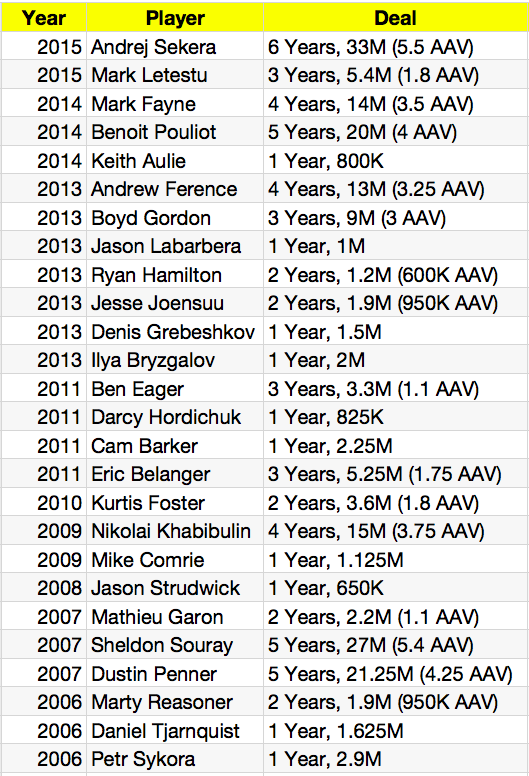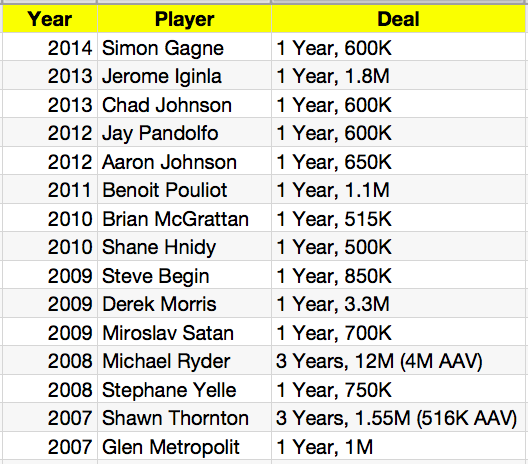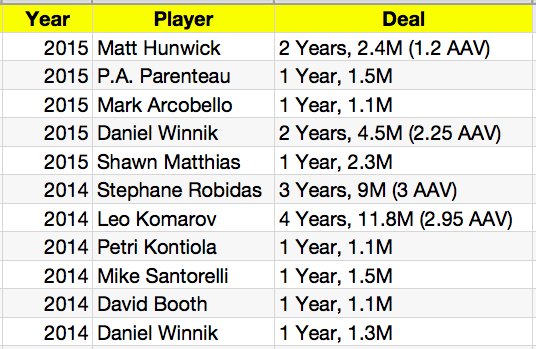Since landing Pronger in the Summer of 2005, the Oilers have been very poor at the free agent market.
They’ve been particular poor at the “Value” table*, where one usually finds rumpled fruit and nearly operational appliances. In the right hands, these disreputable goods can be fixed up into something of value.
*NB: Free agent “value” contracts need to be distinguished from “value” contracts in general, which may potentially include players on entry-level deals, or under restricted free agent control.
During the 2014 Summer, then GM Craig MacTavish, signalled that he clearly understood both that the value market existed and that perusing it from time to time was a good idea.
Just prior to the Free Agent Frenzy last Summer, MacTavish asked the following rhetorical question:
Who are the Grabovski’s of this year that Washington picked up last year. They paid less for a guy like Grabovski and added a good element to their team. Those are some of the guys we’re going to be trying to find as this period and process goes on.
And, immediately after signing Benoit Pouliot, Mark Fayne and Keith Aulie a handful of days later, MacTavish said
Later on in the day we were able to add Keith Aulie, who we feel has an opportunity to be one of the players on a one-year deal that really enhances his value through this period. We were looking at Benoit, we were looking at Anton Stralman, all these players that had come in the year before and really added all this market value to their ability. Benoit in particular was in New York on a million and a half deal or slightly less than that, and he commands this price as did Anton Stralman and I think Keith Aulie has that ability.
In these two quotes, MacTavish does a good job of laying out various implications of the “value” contract (free agent version).
A value contract generally consists of the following:
~ a player who, through various means (injury, unseasonable luck, off-ice issues, burdensome contract), finds himself both on the market and tethered to undesirable narratives/associations.
~ a short term (typically one year) deal allowing both player and team maximal flexibility. If it works out, the player gets to try the market again in the near future under more favorable conditions. If it doesn’t work out, the team hasn’t over-commited itself.
~ a low dollar amount allowing for maximal cap flexibility and making the player attractive to a broader, more high-profile, playoff-bound market come trade deadline.
In essence, a free agent value contract is a low risk (the term and dollar amount are low), high reward (if the player works out, the team gets excellent production for their cap dollar and/or a highly marketable trade asset) proposition.
The Oilers and Free Agent Value Contracts
So, how have the Oilers done in this department? To assess the Oilers we should ask two questions:
- Do the Oilers have a history of pursuing this kind of contract (regardless of whether the bet pays off)?
- Do the Oilers have a record of success with players on value contracts?
To answer these questions, let’s have a look at the Oilers’ free agent signings (excluding players on NHL contracts but clearly destined for farm work) since the run at Stanley.
There are players on this list that signed at, or above, full value, meaning simply: there was no discount on term or cap (Penner, Souray, Khabibulin, etc.). These players either made good on the contract, or didn’t. Regardless, they were never going to be “value” contracts.
There are players on this list that signed one year deals, but at full value, or more, in terms of market dollars (Sykora, Tjarnquist, Barker, Bryzgalov, etc.). These contracts are, at best, qualified value contracts. The limited term involved allows the team the flexibility to move on from a bad or marginal bet in short order. But, the money involved is simply too much to be considered a value contract.
Then, there is a single player, Mike Comrie, that properly looks like an attempt to sign a value contract. Coming into the 2009-10 season, Comrie was a quickly fading NHL player. After a series of successful seasons and lucrative contracts, Comrie’s production started to fade as his injury history mounted. The Oilers took a chance that Comrie could rebound and be productive again, but protected themselves by signing him to short term and dollars. In the end, Comrie got Mono and played about half the season (43 13-8-21).
The Oilers didn’t re-sign Comrie the following season. The Oilers lost the bet. But, I think the Comrie contract, at least, represents an attempt at a free agent value contract. Or, at least a bet was made at the value table. Unfortunately, it is the only one I see over the course of the past near-decade.
Chiarelli’s Bruins and Free Agent Value Contracts
NB: I’ve excluded Chiarelli’s first season as Bruins’ GM, 2006-07, the Chara off-season.
The first thing that stands out here is the clear preference for 1 year contracts. Second, a quick glance and you can see that Chiarelli is keen on the free agent value contract. Several of these players fit the mold: somewhat tarnished (through age, injury, “other”), but once useful players looking for an opportunity to turn around, or increase, their value in short order (Gagne, Iginla, Pouliot, Satan, etc.).
Perhaps the most revealing take-away from Chiarelli’s free agent shopping in toto, is the lack of urgency in evidence. For many of these seasons, Chiarelli already had a solid core of players under control. He could use the free agent market differently. He wasn’t looking for big, long-term solutions, but rather depth on the cheap.
But, it’s not only good teams that can and should exploit the free agent value market.
The Maple Leafs and Free Agent Value Contracts
One considerably poor performing team that seems, of late, to have really taken a shine to the free agent value market is The Big Stupid’s own Maple Leafs.
Over the past two seasons, the Leafs have done a remarkable job at dipping into the free agent market and finding value. The ultimate example of this is the case of Daniel Winnik.
Signed late in the 2014 free agent season to a one year, relatively cheap deal, Winnik played out a season of typical Winnik two-way hockey, receiving a lot of attention along the way (the glare of The Big Stupid didn’t hurt). The Leafs (predictably) were sellers when the trade deadline hit. They sold high on Winnik and then re-signed him this off-season. This is, basically, perfect asset management given the Leafs’ circumstances.
Insert Declarative Statements…
The Oilers, despite being aware of the existence of the Free Agent Value Market, simply don’t have a history of heading down to that end of the store.
Chiarelli, however, does have some history in this area. We can certainly hope he’ll make the Oilers everything they could be in this regard.
Finally, there’s still time…
In short order, the last of the late few free agents of note are going to get antsy and we should see some signings, PTOs, and players bolting for Europe. Maybe one or two of them will get a call from Peter.



